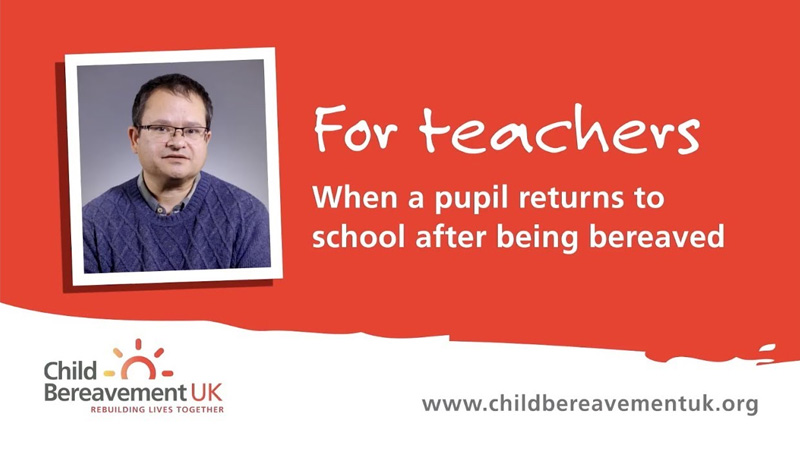It’s important for the school and family to manage a child’s return, ensuring that the pupil settles back in with the least amount of anxiety and stress. Avoid making assumptions based on culture or family background; always ask to find out the beliefs and thoughts of a family so that home and school can provide consistent support.
Click the arrow to expand each one or click here to expand all of the examples below:
Keep informed
Before a child returns to school, try to speak to the family so that you’re aware of the cause of death and what the child has been told about it. It can be helpful to set up a meeting with the family/carers, the pupil and significant adults in school to discuss their return, and find out what they need and what they can expect from school. Pass on information to all staff.
Which adults will meet with the pupil?
This will depend on the type and size of the school as well as the relationship with the pupil. Where possible offer some flexibility and choice on who the bereaved pupil would like to talk to.
Discussion with pupil and their family/carers
Acknowledge the death and ask what they want to do about sharing their news. Do they want everyone, no-one or just their close friends to know? What sort of support do they feel they need? Time out, opportunities to speak to a trusted adult, help with friendships etc. A bereaved pupil may wish to arrive at school a little early or late on their first day to avoid the crowd.
Organise ‘time-out’
Agree a way for the child to indicate to you that they need some time to themselves or are feeling upset. It could be a card they put on the table so that they don’t have to say anything, or a simple signal such as placing their bag on the desk. Give the pupil options of places to go if they’re upset and need time out, and speak to them about who will accompany them, or come to check on them.
Prepare ‘time-out’ activities
Some bereaved young people find doing an activity helpful when they are feeling upset or overwhelmed. Activities such as painting, writing a journal, drawing, craft, construction or computer-based educational ‘games’ can be helpful.
Manage lunchtimes
Ask the pupil who they would like to have lunch with. They may prefer to have lunch alone or with a teacher at first, but encourage them to have some social interaction. Offer choices which include time with their peers to try to avoid them becoming isolated in their grief.
Check in regularly
Have regular check-ins with the pupil to make sure that they are OK. Ask them if they need anything different to help them manage.
Encourage their friends to be supportive
Find out who they see as their friends and who they trust. Ask the friends to be supportive and understanding if their friend is sad or upset.
Maintaining boundaries
Maintain a sense of normality and stability by continuing to expect usual standards of behaviour, within the pupil’s limitations. This helps to reduce feelings of favouritism amongst other children and ensures that they are keeping themselves and others safe, and can help make things feel reassuring and predictable.
Don’t expect too much
Let the pupil ease back into schoolwork and don’t expect too much from them in terms of homework. Liaise with their carers about setting short-term, achievable targets. Try to find out what they enjoy doing and give them opportunities to do these things. They need to know that it’s okay to have fun and that it doesn’t mean that they are no longer sad or missing the person, just because they are enjoying themselves.


